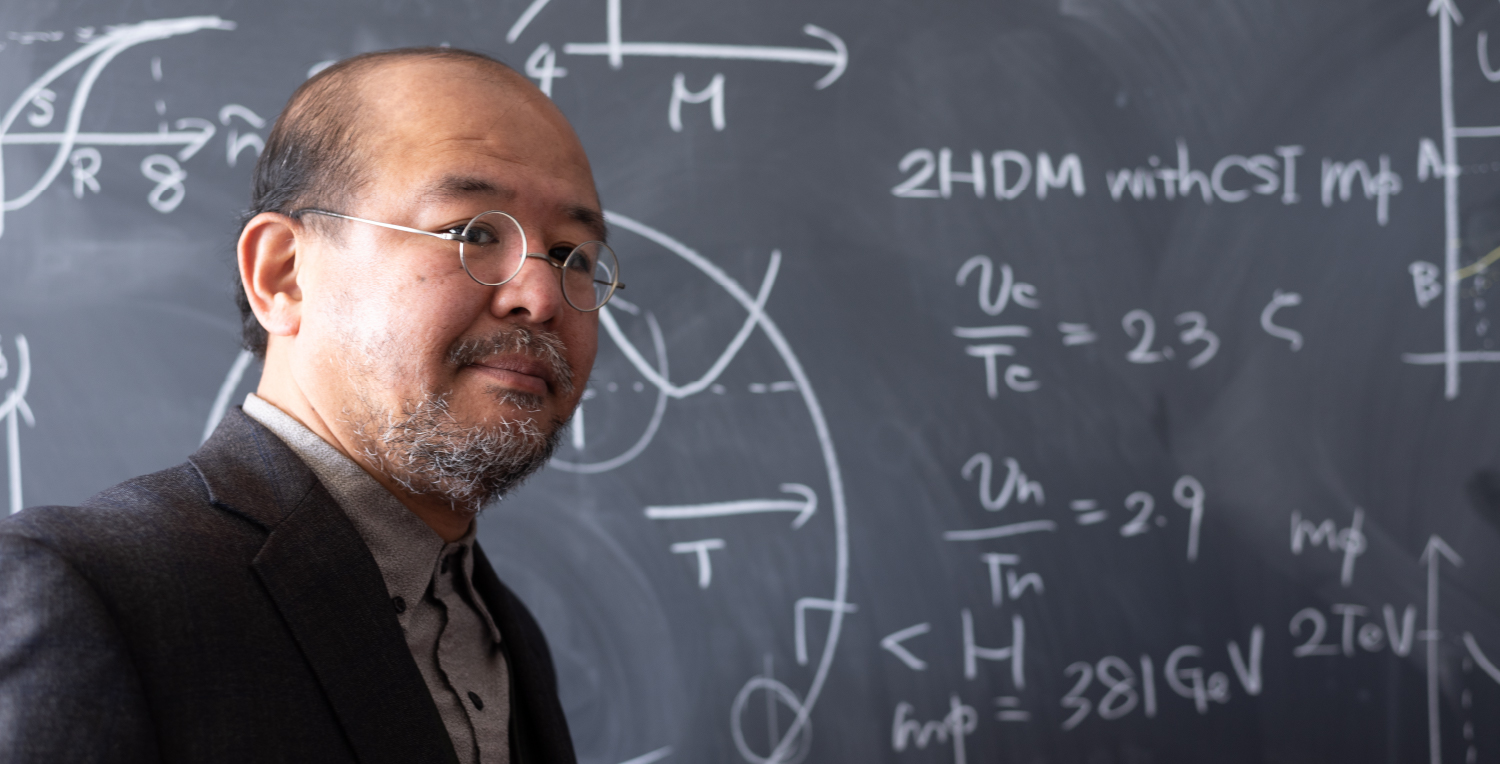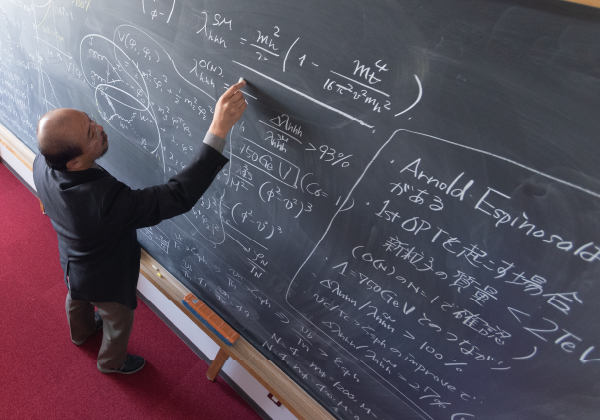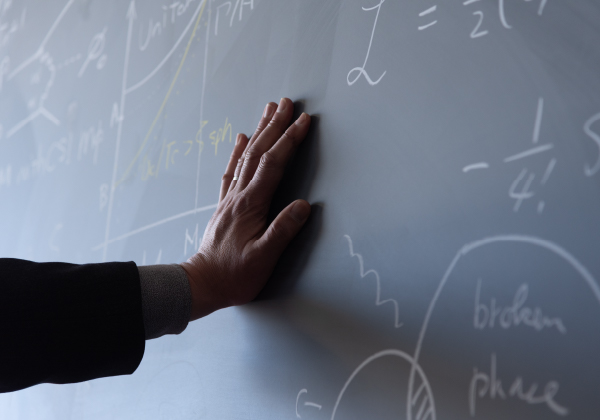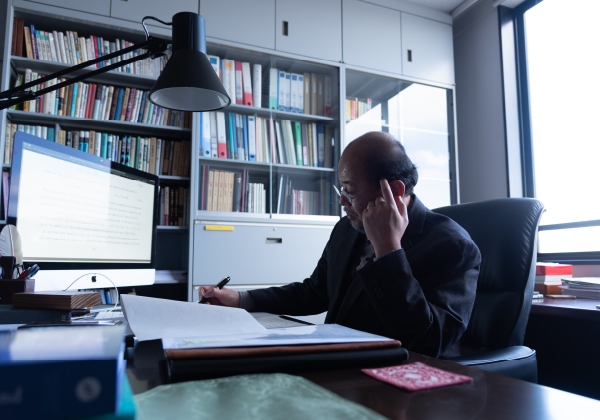Feeling the influences of Dr. Yukawa in daily theoretical physics research activities

|
Q:Please describe the image of Hideki Yukawa you had when you were a student. I knew a little about Hideki Yukawa because I read his biography written for children when I was an elementary school pupil. When I was a freshman in senior high school, I read an essay written by Hideki Yukawa tilted “Self-discovery,” which left strong impact in me. It negatively affected the image I had about theoretical physics. The essay described about Hideki Yukawa’s unique experience during a summer seaside camp education program that made him realize he was a lonely person not liked by others. According to the biography, that experience was one of the reasons that later make Yukawa choose theoretical physics over all other academic subjects as a field of his study. He wanted to avoid involvement with other people and be completely immersed in his work. The essay described Yukawa’s somewhat dismal memories. Before reading the essay, the image of theoretical physics were expanding in my mind through the reading of various books, but reading the essay somewhat spoiled the image I had. As a matter of fact, research activities in the field of theoretical physics in modern days include frequent discussions and debates with others, so actual situations were quite different from the description in the essay. I learned this when I became a graduate student. It is also commonly known today that Dr. Yukawa was engaged enthusiastically in the discussions with other researchers on the theory of elementary particles. |
|
|
|
Q:Please tell us your memories of Hideki Yukawa and about the Yukawa Memorial, The University of Osaka. When I was a graduate student, I was a member of the Particle Physics Theory Group at The University of Osaka. There, I came to know that you could still feel the influences of Dr. Yukawa remaining from the years when he was at Osaka Imperial University. I also knew that the Yukawa Memorial, The University of Osaka was established. Dr. Yukawa achieved the research results at this university which later brought the Nobel Prize to Japan for the first time. He also received his Doctor of Science degree from this university on account of that. Episodes like this continue to be passed down from generation to generation. Until about 2000, the Yukawa Memorial’s elegant lounge lined with a red carpet was located in the nuclear research facility adjacent to the east side of the School of Science building, and the Particle Physics Theory Group used to hold a seminar regularly there. I participated in the seminar by Prof. Nambu Yoichiro there. When I was a master course student, the group theory class by Prof. Keiji Kikkawa was also held there, who was the professor of Particle Physics Theory Group in those days. It is a very memorable place for me. The building was torn down several years ago due to its old age. Incidentally, when I was a student, I was living in a boarding house in the precincts of a temple near that place, so I could reach the building by walking on the overpass to cross the expressway. Even if I woke up 10 minutes before the seminar, I could still make it before it started (with a laugh). |
|
Q:Can you describe how magnificent Dr. Yukawa’s achievements were from the viewpoint of a researcher of theoretical physics? I have been engaged in theoretical research for many years, and my research topics range from the mass generation mechanism of elementary particles by spontaneous electroweak symmetry breaking (Higgs boson physics) to new physics beyond the standard model. First, I build a hypothesis and construct a physical model. Then, I attempt to explain various phenomena that cannot be described by using standard theories. I sometimes introduce an unknown particle in my hypothesis. This process is similar to the process Dr. Yukawa used for predicting the existence of meson. Dr. Yukawa was the pioneer of this approach method. He believed that the nuclear force, which was not well known at that time, came from the particles called pi mesons, and he predicted its mass. The meson was later discovered in an experiment, and Dr. Yukawa’s hypothesis was proven correct. In those years, it was not as common to hypothesize a new particle as it is today, so I reckon it took a lot of courage to announce the hypothesis. Needless to say, the meson theory is a great theory, and Dr. Yukawa’s courage to announce such a ground-breaking theory without fear is equally amazing. |
|
|
|
Q:How do you think the modern theory of elementary particles has been influenced by Dr. Hideki Yukawa? The theory of nuclear force became understandable to researchers as the studies on the quark, an elementary particle, and quantum chromodynamics that governs quark interactions advanced, so the standard model of particle physics was completed. Yukawa’s theory of meson was rewritten accordingly, but the idea that the force that acts on elementary particles is mediated by particles is still valid in today’s most advanced physics. As mentioned above, researchers now have no reluctance to hypothesize a particle in order to explain a new phenomenon. In this regard, I think Dr. Yukawa’s influences were immense. In particle physics, the strength of the interacting force between a Higgs particle and a quark or lepton is called a Yukawa coupling. The term, Yukawa coupling, may be the most frequently used Japanese-originated physics term used in modern particle physics. In fact, the titles of eight papers out of all research papers I wrote contained the words “Yukawa coupling.” I always feel the presence of Dr. Yukawa near me. |








